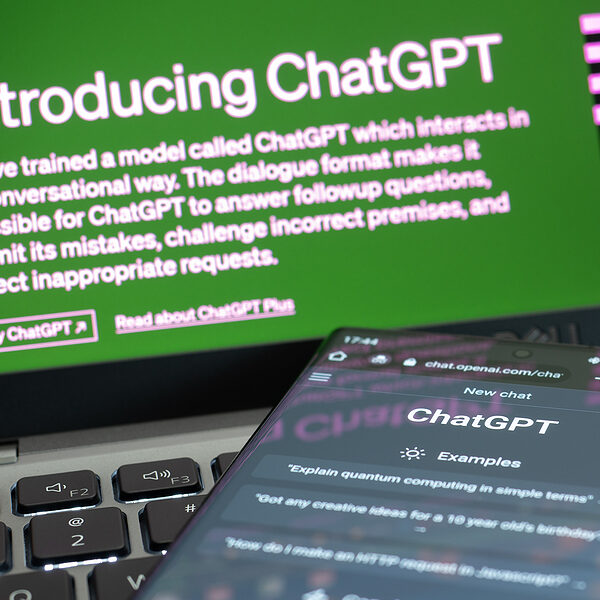Marketers Should Be Cautious Using ChatGPT
ChatGPT is all the rage now; it writes novels, poetry, code, blog posts, sales letters — whatever you want. And it does it almost as well as a human. Naturally, marketers, bloggers, and content creators are jumping on the AI bandwagon, and while ChatGPT and other AI tools are helpful, it’s unwise to rely too heavily on them, and here’s why.
 The Content Is Generic
The Content Is Generic
While ChatGPT and other AI tools put out content that’s readable and passes for something a human wrote, the overwhelming majority of it is generic. If you’ve ever worked with a content mill before, ChatGPT gives the same quality for less money.
Generic content is fine if you need a lot of text to fill up a website quickly, and you may even be able to massage it enough to get it to rank, but it isn’t good for branding because it lacks the personal touch that people crave now more than ever.
Why does this matter?
This quote from an article at AS Marketing sums it up best. Story-based copy gives your business human values and attributes, which makes your business more approachable and relatable. For instance, if you landed on a website that was bland, very keyword-centered, and overall felt like it was run by robots, would you be moved to purchase from them? Probably not. (Emphasis mine.)
Google is Coming For It…Maybe
One has to give OpenAI, creators of ChatGPT, credit because they’ve made the folks at Google a little nervous. Google seems to have been caught off guard regarding the popularity and ubiquity of chatbots despite their chatbot Apprentice Bard, which is still in the testing phase.
Seemingly late to the party, however, may have more to do with the company wanting an AI chatbot that provides more factual information, something that’s missing with the current iteration of ChatGPT, which we’ll cover shortly.
However, for marketers and content creators who want to use content garnered from AI software and ChatGPT for ranking purposes, Google is closely looking at this content. According to an article at SE Journal, Google’s Search Advocate, John Mueller, said AI written content goes against their webmaster guidelines and considers it akin to spam. During a Q&A with Mueller, he explained Google’s position on AI-generated content related to the article-spinning techniques of years ago.
My suspicion is maybe the quality of content is a little bit better than the really old-school tools, but for us, it’s still automatically generated content, and that means for us, it’s still against the Webmaster Guidelines. So, we would consider that to be spam. The company has since backtracked on flagging AI content as spam because as AI gets better, it will become more difficult to detect whether a human or chatbot has written the content.
As of this writing, Google hasn’t officially said whether they’re detecting AI-written content, but they’re still focusing on content that’s helpful to the reader, which is more likely to show up higher in their search rankings. The experts disagree on whether AI-generated content will affect search engine rankings, but the people at SEO.AI say it doesn’t matter whether Google can detect AI-generated content or not. What matters is whether the content generated by a human or an artificial intelligence algorithm is helpful to the users. This is the content that Google wants to promote in its search result (SERPs) as it best answers the user’s query.
Generic Content Doesn’t Sell
Remember when you were a kid and loved hearing a story before going to bed? We’ve been telling stories to one another for as long as we’ve been human.
Stories connect us and inspire us.
Whether you’re a marketing company or a business, using stories is an excellent way to build brands, trust, and customer loyalty. While AI-generated copy can string words together in coherent sentences, it can’t tell your audience how your company or products solved a specific problem like, say, a case study can; it can’t create a voice that’s unique to your brand, and it certainly won’t help you stand out from the crowd.
None of this is to say that tools like ChatGPT aren’t useful for marketers, content creators, or freelancers because they are. However, if you view these tools as a fast, cheap, easy way to do business, it’s probably not going to work. To hammer home this point, consider this quote from Chris Lavigne in an article at Digiday speaking about ChatGPT: We’re about to see a huge influx of mediocre, average content. Brand is more important than ever. Establishing yourself as somebody that you can trust to curate the right information is going to be more important than ever.
It Makes plenty of Mistakes
To understand why ChatGPT and other AI content software make so many mistakes, you need to understand how it works. GPT-3 is a language prediction model, which means it takes a prompt and provides what it thinks a helpful response will be. GPT-3 was pre-trained on several data sets; however, it isn’t constantly learning and has limited knowledge of events that occurred after 2021.

Because ChatGPT provides answers based on a limited (albeit large) dataset, it still gives inaccurate information, false claims, and content that might be plagiarized. The bottom line is that if you’re not doing your due diligence, loading a site with content generated from ChatGPT could significantly harm your brand.
ChatGPT and what’s coming down the road are amazing tools you can use in your marketing efforts. However, high-quality content that resonates with your target audience is more important now than ever if you want to stand out, as the web is about to see a deluge of generic, soulless copy.
Brandtastic Gets You
At Brandtastic, we understand what it takes to make your business stand out because we’ve done it time and again. Whether it’s web design, SEO and analytics, Google Ads, social media marketing, content creation, or graphic design, we have a long history of working with companies like yours to make you stand out from the crowd and drive paying customers to your business. Schedule a free consultation with one of our experts today by calling 813-441-0275 or filling out our online form.



